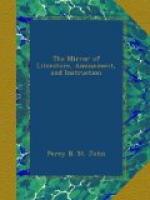[4] We should like to see
a volume of poems written by Wordsworth,
and
illustrated by Gainsborough. How delightfully
too would a
few
of the poet’s lines glib off in a Juvenile Annual.
* * * * *
EDIE OCHILTREE.
From the New Edition of “The Antiquary."
Of the “blue gowns,” or king’s bedesmen, from whom the character of Edie Ochiltree was drawn, after giving an account from Martin’s “Reliquiae Divi Sancti Andrae,” of an order of beggars in Scotland, supposed to have descended from the ancient bards, and existing in Scotland in the seventeenth century, but now extinct, Sir Walter Scott says:—
“The old remembered beggar, even in my own time, like the Baccoch, or travelling cripple of Ireland, was expected to merit his quarters by something beyond an exposition of his distresses. He was often a talkative, facetious fellow, prompt at repartee, and not withheld from exercising his powers that way by any respect of persons, his patched cloak giving him the privilege of the ancient jester. To be a gude crack, that is, to possess talents for conversation, was essential to the trade of a ‘puir body’ of the more esteemed class; and Burns, who delighted in the amusement their discourse afforded, seems to have looked forward with gloomy firmness to the possibility of himself becoming one day or other a member of their itinerant society. In his poetical works, it is alluded to so often, as perhaps to indicate that he considered the consummation as not utterly impossible. Thus, in the fine dedication of his works to Gavin Hamilton, he says—
“And when I downa yoke a naig,
Then, Lord be thankit, I can beg.”
Again, in his Epistle to Davie, a brother poet, he states, that in their closing career—
“The last o’t, the warst o’t,
Is only just to beg.”
And after having remarked, that
“To lie in kilns and barns at e’en,
When banes are crazed and blude is thin,
Is doubtless great distress;”
the bard reckons up, with true poetical spirit, the free enjoyment of the beauties of nature, which might counterbalance the hardship and uncertainty of the life even of a mendicant. In one of his prose letters, to which I have lost the reference, he details this idea yet more seriously, and dwells upon it, as not ill adapted to his habits and powers.
“As the life of a Scottish mendicant of the eighteenth century, seems to have been contemplated without much horror by Robert Burns, the author can hardly have erred in giving to Edie Ochiltree something of poetical character and personal dignity, above the more abject of his miserable calling. The class had, in fact, some privileges. A lodging, such as it was, was readily granted to them in some




